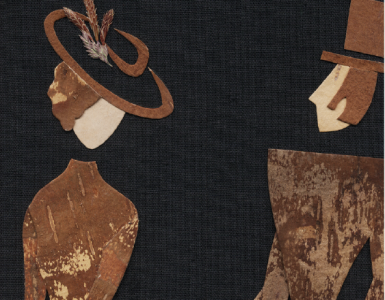by Denise Noe
First published in February/March, 2005, Volume 2, Issue 1, The Hatchet: Journal of Lizzie Borden Studies.
The name Lizzie Borden has become synonymous with both murder and mystery. Perhaps for that reason, people wanting to suggest an outlandish aspect to their character have taken her name as their own. This is somewhat ironic because, whether or not Lizzie committed the vicious double parricide, the first Lizzie Borden was indisputably a person of modesty and public reticence. She would certainly be appalled at the number of exhibitionists and artists who have so identified with her that they have either legally changed their names to hers or used her as a stage name.
One of her most prominent contemporary namesakes is a heavy metal rock band named Lizzy Borden and its lead singer, a wild-eyed muscular male, is known by the same moniker. The band formed in Los Angeles during the 1980s and quickly built a large regional following. Their CDs include Menace to Society, Terror Rising/Give ‘Em the Axe, and Love You to Pieces. As musical tastes shifted in the 1990s, the Borden band decided to disburse. Lead singer Lizzy Borden formed another band called Diamond Dogs. He and the rest of the Lizzy Borden band reunited in early 2000 and released an album called Deal With the Devil.
Deal With the Devil was positively reviewed by R. Scott Bolton in RoughEdge.com. He wrote that the CD “shows there has been no loss of power or metal attitude over the years” and said it “fits nicely in with all those previous Lizzy Borden CDs. Loaded with blistering guitar, razorblade vocals and more than a healthy dose of rock’n’roll imagination, Deal should appeal to any heavy metal fan.”
Feminist filmmaker Lizzie Borden is best known for her 1986 movie Working Girls. The R-rated movie won accolades for its gritty, non-glamorous depiction of prostitution. The film shows a day in the life of Molly (Louise Smith), a woman who lives with her lesbian lover and child and works in a brothel located inside a New York City condo.
Joining those who praised the film as important, Roger Ebert in the Chicago Sun-Times wrote that he “was moved less by the movie’s conscious attempts at artistry than by its unadorned honesty: The director, Lizzie Borden, has created characters who seem close to life, and her movie helps explain why the world’s oldest profession is, despite everything, a profession.”
Filmmaker Lizzie Borden was born on February 3, 1958, the daughter of a Detroit stockbroker. Her given name was Linda, which she retained until she was eleven years old and heard the children’s rhyme about the famed ax murderer. Perhaps foretelling her iconoclastic tendencies as an artist, young Linda changed her name to Lizzie Borden.
Borden’s signature film is considered Born in Flames (1983). Set in a near future after a “Social Democratic War of Liberation,” Flames focuses on active, militant feminists who use violence to accomplish their goals. Responding to those feminists who criticized her for depicting violence as a “solution” to oppression, Borden replied, “I asked many, many women if they would ever use violence, and the answer was always no. How convenient for the government. I’m posing the question: What if we did?”
A pornographic actress, director, and wrestler known professionally as Lizzy Borden (real name Janet Romano) has conclusively proven that a woman can degrade other women as much as any man. Her deliberately repulsive movies show women being spat upon, urinated on, smeared with excrement, and eating vomit.
Janelle Brown writes in a Salon.com article that Borden once claimed “to have spent her youth in an insane asylum after murdering her family, á la the original Lizzy Borden.” The background she recounted to Brown was slightly more prosaic: she was raised in conservative Orange County, California, in a financially struggling Italian Catholic family. She had a stay-at-home-mom and three half-siblings. She claimed her heavily drinking father frequently assaulted her mother and that mom in turn “took out her own frustrations” by beating Borden “with her fists and assorted sharp objects.”
The young adult Borden enjoyed parties and drugs, worked as a stripper and, eventually, a pornographic actress. She married porn director Rob Black of Extreme Associates and promptly gave up acting in such films because Black did not want his wife in porn! She pressed him for a chance to direct. The Salon article quotes Borden as saying Black was reluctant because women “shoot all the soft stuff, all the lovey-dovey stuff that there’s not a big market for.”
Borden believed she could out-gross any male director. When given her chance behind the camera, she proved it. She directed a movie called Fossil F——-s, in which elderly women have sex with young men, Cocktails, in which women drink beverages that include vomit and other bodily fluids, and Cannibalism, in which people appear to devour human organs. The porn director told Brown that she “acts just like a guy” but her version of masculinity is not that of a gentleman but one of sinking into the most obnoxious forms of behavior.
In August of 2003, Rob Zicari and Janet Romano, better known within adult film circles as Rob Black and Lizzie Borden of Extreme Associates, were indicted on 10 charges by a federal grand jury for allegedly distributing obscene materials via the United States Postal Service and the Internet. In a surprise ruling, on January 24, 2005 the federal government dropped all obscenity charges against the pair.
All three of these Lizzie namesakes have a suggestion of transgressive sexuality and violence in their personas. The first historically known Lizzie Borden died in 1927, well within the Jazz Age, but she was herself a child of the Victorian era, a period most identified with sexual repression. The possibility exists that her stifled impulses may have exploded in two heinous murders and leads her name to attract a metal rocker, an iconoclastic filmmaker, and a pornographer.
Has anyone heard an inexplicable buzz in the Fall River Cemetery? It’s the sound of the original Lizzie Borden, always prim and proper, ever the private person, whirling in her grave at the antics of her contemporary namesakes.
Works Cited
Bolton, R. Scott. “Lizzy Borden: Deal with the Devil.” RoughEdge.com, 22 Aug. 2002. 30 Jan. 2005 <http://roughedge.com/cdreviews/l/lizzyborden.htm>.
Baumgarten, Marjorie. “Light It Up.” The Austin Chronicle, 22 June 2001. 30 Jan. 2005 <http://www.austinchronicle.com/issues/dispatch/2001-06-22/screens_feature.html>.
Brown, Janelle. “Porn provocateur.” Salon.com, 20 June 2002. 30 Jan. 2005 <http://www.salon.com/mwt/feature/2002/06/20/lizzy_borden/>.
Ebert, Roger. “Working Girls.” RogerEbert.com, 13 March 1987. 30 Jan. 2005 <http://rogerebert.suntimes.com/apps/pbcs.dll/article?AID=/19870313/REVIEWS/703130303/1023>.
Harrington, Richard. “Working Girls.” WashingtonPost.com, 25 March 1987. 30 Jan. 2005 <http://www.washingtonpost.com/wp-srv/style/longterm/movies/videos/workinggirlsnrharrington_a0aa33.htm>.
Harrington, Richard. “Love Crimes.” WashingtonPost.com, 27 Jan. 1992. 30 Jan. 2005 <http://www.washingtonpost.com/wp-srv/style/longterm/movies/videos/lovecrimesrharrington_a0ab23.htm>.
Kempley, Rita. “Erotique.” WashingtonPost.com, 23 Sept. 1994. 30 Jan. 2005 <http://www.washingtonpost.com/wp-srv/style/longterm/movies/videos/erotiquenrkempley_a0a48f.htm>.






